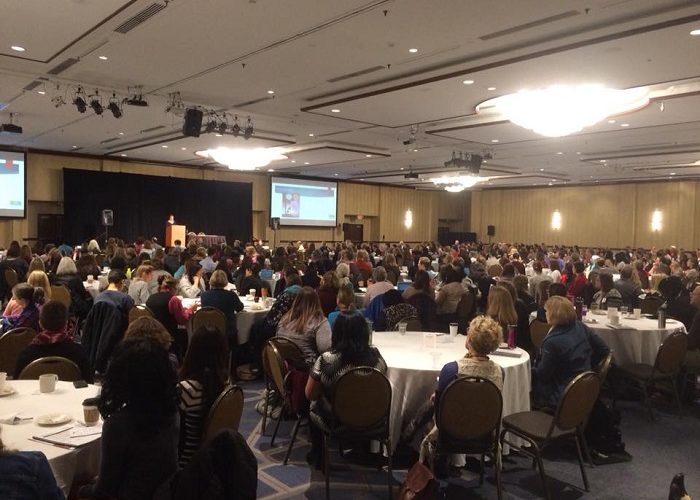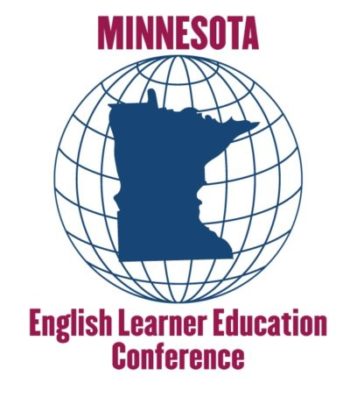- MN ABE Connect
- Archive
- MELEd 2019: Sharing What We Learned at the State ESL Conference – Part II
 January 13, 2020
January 13, 2020
MELEd 2019: Sharing What We Learned at the State ESL Conference – Part II
Compiled by Patsy Egan, Director In late November 2019, ATLAS sponsored 18 ABE teachers to attend the state ESL gathering (MELEd) in St. Paul. MELEd is the two-day Minnesota English Learner Education conference put on by MinneTESOL, Minnesota Teachers of English to Speakers of Other Languages, in partnership with the Minnesota Department of Education. This annual conference draws over 1100 ESL educators from around the state, working in K-12, college, and adult learning contexts! Below are some of the main takeaways from our ABE colleagues from their time at MELEd.
In late November 2019, ATLAS sponsored 18 ABE teachers to attend the state ESL gathering (MELEd) in St. Paul. MELEd is the two-day Minnesota English Learner Education conference put on by MinneTESOL, Minnesota Teachers of English to Speakers of Other Languages, in partnership with the Minnesota Department of Education. This annual conference draws over 1100 ESL educators from around the state, working in K-12, college, and adult learning contexts! Below are some of the main takeaways from our ABE colleagues from their time at MELEd.
Kristine Rikkola, Lake Superior College Duluth, MN
Wow! So many interesting sessions and good information to put into practice. Some of my favorite sessions were Bridging the Gap Between ESL and Non-ESL Faculty at Institutions of Higher Learning with Molly C. Rojas Collins and Margaret Delehanty Kelly. This was a topic that resonated with me because one of my positions at LSC is ELL support and I often struggle with effective communication about ELL topics with other faculty. This session had a great conversation about this topic and also valuable advice and resources to assist me on campus.
Lessons Learned Abroad: Doing What Matters for Newcomer Students and Families with Rhonda Petree and her husband Don Kirkpatrick was filled with good advice about traveling abroad and the information you forget to ask about but needed to learn. This advice will assist me with the ESL students I work with on-campus and also information I can share with Student Life services on campus.
Life is a Logical Way to Teach American Idioms with Justin Petersen and Critical Thinking for All Learners with Adam Kuehnel were sessions that I could have listened to for a whole day. So grateful for their resources and how they presented their information was so engaging. Thank you for this conference filled with great information, resources, and advice that will assist me in working with all my ELL students.
Angela Haynes, Albany MN ABE
I found tidbits that reinforce good teaching strategies for Title 1, High Potential as well as the ABE ELL students that I work with. I especially enjoyed a session on critical thinking. The presenter shared ways to dialogue with adult learners using interesting photos. Learners can build stories by identifying characters, setting, action and main ideas without having to read a long passage. This simple task self differentiates because students add information from their own background knowledge. Whether working with Title 1 students, or gifted students, I can encourage learners to build upon their own knowledge and share that knowledge with their peers. In another session, Robert Frischmon offered down to earth practices by using student’s real life responsibilities from their workplace to build literacy. He begins with words and phrases that represent their daily life, then slowly he builds this information into dialogue and conversation with his adult learners. These strategies are winners and are takeaways I can implement right away.
Jennifer Johnson, Mankato ABE, MN
What You Can Do for Immigrant SLIFE: Foundations for Understanding was an inspiring session. It was my final session on Friday afternoon, I arrived with my mind already quite full from a day of exciting and thought provoking sessions. From the moment I sat down the presenter, Nan Frydland, was engaging. She engaged each participant in challenging and relevant material. During the session she built a framework for how we can and should integrate lived experience into our classrooms to make academic learning more relevant for SLIFE learners. I was not familiar with the acronym SLIFE nor with the idea that so much research has been done in this area. Many of the students in our program are SLIFE students and I am thrilled to learn more about the unique challenges and resources of working with these students. I was particularly impressed with how Nan was able to tie pedagogy, social justice, and teaching practice together. This session was so thought provoking that, even after a very long day, I lingered to talk with the presenter for an additional 30 minutes. Unfortunately I was not able to attend her session on Saturday but I look forward to continuing my conversation with her and viewing the materials from the her Saturday session.
Karen Loe, Harmony ABE, Maplewood
One of the most useful sessions I went to was the Idiom session from Justin Peterson. I teach idioms myself but rather sporadically. I used to be more diligent about them but then I was derailed by other things. However, this session helped to reinforce how much idioms are actually used by our society and how difficult they can be to navigate! First, I was even more amazed at how many idioms are used in the English language. But the number one thing I took away from this was that after discussing idioms and learning the students were given paragraphs that contained idioms they had not been exposed to and were able to identify many of them. I think it is a good skill for my adult learners to have – to at least think maybe what a person is saying does not mean it word for word but there is another meaning to it and what is in in the context of what they are saying. The session also gave me methods on how to teach them more cohesively.
Also, Saturday’s keynote speaker, Ofelia Garcia, was wonderful!
Susan Seyfarth, Mounds View ABE/Digital Literacy
I really enjoyed Michelle Niska’s session about using College Career Readiness resources. I teach digital literacy to displaced workers right now but we’re considering how we can make our curriculum more available to English Learners. It was super informative to hear about the College Career Readiness resources that already exist, and how they’re being used in this context.
Patsy Egan, ATLAS, St. Paul
Time to be counted! With the census coming up in spring 2020, it’s critical that all our adult students understand and fill out the census. I so appreciate Stephanie Sommers’s presentation on census-elated materials at the Adult Interest Section meeting on Saturday at MELEd.
- One resource I was unfamiliar with is the language guides available to assist speakers of other languages with this important civic task. They are available in 59 languages!
- Stephanie introduced us to additional materials available for teachers from www.census.gov, the National Coalition for Literacy, as well as LA Unified School District. The LA Unified site has extensive lesson plans for teaching adults at various levels of English proficiency about the census.
- More information and links in this recent newsletter article as well.
A BIG thank you to the outgoing Adult Interest Section leaders, Emily Richardson and Janice Bisch for their leadership in MinneTESOL!
NOTE: This is Part II of sharing from the MELEd conference. Part I was published on 12/17/19.
And if YOU teach English, you’ll want to be sure and join ATLAS for its largest event, the Language & Literacy Institute on January 23-24, 2020, in Minneapolis. Registration ends THIS FRIDAY, January 17!
Get more details and register at https://atlasabe.org/event/2020-language-literacy-institute/
Newsletter Signup
Get MN ABE Connect—the official source for ABE events, activities, and resources!
Sign UpArticle Categories
- ABE Foundations/Staff Onboarding
- ACES/Transitions
- Adult Career Pathways
- Assessment
- CCR Standards
- Citizenship
- COVID-19
- Cultural Competency
- Digital Literacy/Northstar
- Disabilities
- Distance Learning/Education
- ELA
- Equity/Inclusion
- ESL
- HSE/Adult Diploma
- Listening
- Math/Numeracy
- Mental Health
- Minnesota ABE
- One-Room Schoolhouse/Multilevel
- Professional Development
- Program Management
- Reading
- Remote Instruction
- Science
- Social Studies
- Speaking/Conversation
- Support Services
- Teaching Strategies
- Technology
- Uncategorized
- Volunteers/Tutors
- Writing